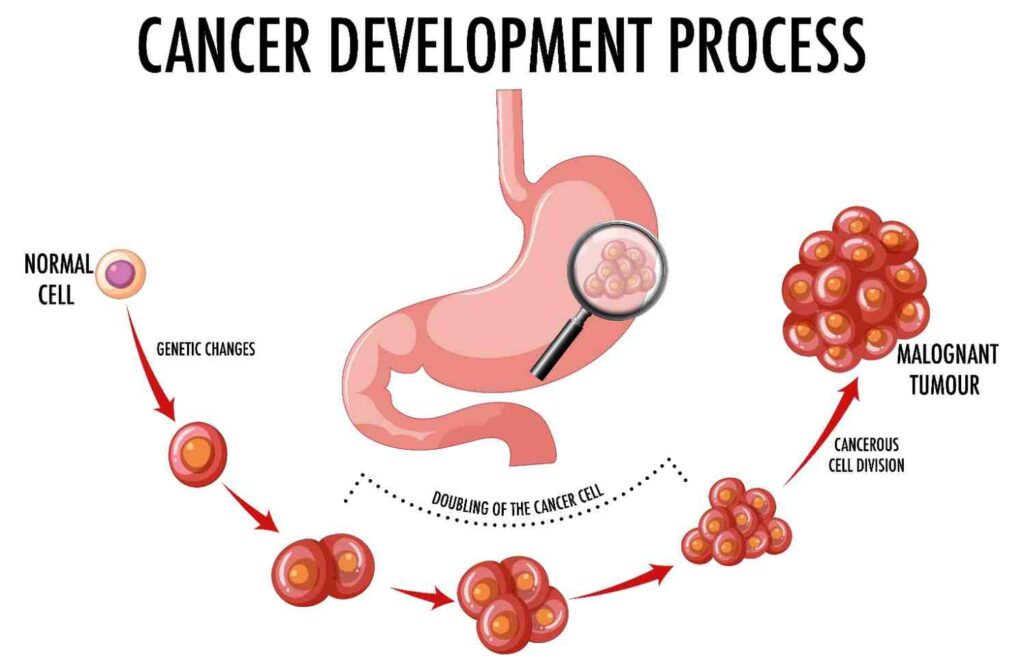Stomach cancer, also known as gastric cancer, is the development of cells that begins in the stomach. Understanding the signs and symptoms is crucial, as I learned through my own journey, which led me to discover How I Know I had stomach Cancer.
The stomach is located in the upper middle of the abdomen, close to the ribcage. The stomach helps to break down and digest meals.

Stomach cancer can develop in any area of the stomach. Stomach cancers most commonly occur in the stomach’s major section. This section is known as the stomach body.
Stomach cancer in the United States is more likely to start at the gastroesophageal junction. This is where the lengthy tube that transports the food you swallow reaches the stomach. The tube that transports food to the stomach is known as the esophagus.
One factor that health care specialists consider when developing a treatment strategy is the location of the cancer in the stomach. Other considerations could include the cancer’s stage and the type of cells involved. Surgical removal of the stomach cancer is frequently used as treatment. Other treatments may be administered before and after surgery.
Stomach cancer treatment is more likely to be effective if the cancer only affects the stomach. The outlook for persons with minor stomach malignancies is favorable. Many people hope to be cured. Most stomach cancers are discovered when the disease is advanced, making a cure less likely. Stomach cancer that develops through the stomach wall or spreads to other areas of the body is more difficult to treat.
Top Causes of Stomach Cancer
It’s unclear what causes stomach cancer. Experts believe that most stomach cancers begin when something damages the stomach’s inner lining. Examples include having a stomach infection, having chronic acid reflux, and consuming a lot of salty foods. Not everyone with these risk factors develops stomach cancer, however. More research is needed to determine exactly what causes it.
Stomach cancer develops when something causes damage to cells in the stomach’s inner lining. It creates alterations in the DNA of the cells. A cell’s DNA stores the instructions that teach it what to do. The modifications direct the cells to multiply rapidly. The cells can continue to live even when healthy cells would normally die. This causes a large number of extra cells in the stomach. The cells can form a mass known as a tumor.
The Common Causes of Stomach Cancer are:
H. pylori bacterial infections : A common stomach illness that frequently causes ulcers.
Tumors: Tumors that appear elsewhere in the gastrointestinal tract.
Stomach polyps :Abnormal tissue growths in the stomach lining.
Stomach reflex (GERD).
What are the main symptoms of stomach cancer
1. Trouble swallowing
2. Abdominal discomfort
3. Feeling bloated after a meal
4. Feeling full after eating a small amount of food
5. Not feeling hungry when you should be hungry
6. Heartburn
7.I ndigestion
7. Nausea
8. Vomiting
9. Lose weight without trying
10. Feeling quite exhausted.
11. Stools that appear black
What are different types of stomach cancer
The type of stomach cancer that one has is determined by the type of cell in which the disease developed. Some examples of stomach cancer kinds are:
Adenocarcinoma : Adenocarcinoma stomach cancer develops in cells that create mucus. This is the most frequent kind of stomach cancer. Nearly of stomach malignancies are adenocarcinomas.
Gastrointestinal Stromal Tumors (GIST) : GIST originates in specific nerve cells present in the stomach wall and other digestive organs. GIST is a kind of soft-tissue sarcoma.
Carcinoid tumour : Carcinoid tumors are malignancies that originate in neuroendocrine cells. Neuroendocrine cells are distributed throughout the body. They perform nerve cell duties as well as hormone-producing cell work. Carcinoid tumors are a form of neuroendocrine tumour.
Lymphoma : Lymphoma is a cancer that begins in immune-system cells. The body’s immune system attacks bacteria and viruses. Lymphoma can sometimes begin in the stomach when the body sends immune system cells there. This may occur if the body is attempting to fight off an illness. Most lymphomas that begin in the stomach are non-Hodgkin’s lymphoma.
Risk Factor of Stomach cancer
Factors that enhance the risk of stomach cancer are:
The following factors enhance the risk of stomach cancer:
- Ongoing issues with stomach acid backing up into the esophagus, known as gastroesophageal reflux disease.
- A diet rich in smoked and salty foods.
- A diet with few fruits and vegetables.
- A stomach infection caused by the Helicobacter pylori bacteria
- Gastritis is the swelling and inflammation of the stomach’s insides.
- Smoking.

How to Prevent Stomach Cancer naturally?
- Eat a lot of fruits and veggies. Try to eat fruits and veggies every day. Select a choice of colorful fruits and veggies.
- Reduce the quantity of salt and smoked foods you consume. Limiting these meals will help protect your stomach.
- Stop smoking. If you smoke, quit. If you don’t already smoke, don’t start. Smoking raises your chances of stomach cancer and other types of cancer.
- Quitting smoking might be difficult, so consult your doctor for assistance .
- Inform your healthcare professional if stomach cancer runs in your family. People with a strong family history of stomach cancer may be screened.
- Screening tests can discover stomach cancer before it develops symptoms.
How to detect stomach cancer early ?
If you have any concerns, don’t hesitate to get in touch with your healthcare professional. When someone is at risk for stomach cancer or is exhibiting symptoms, there are screening tests available. Among the diagnostic tests for stomach cancer are:
1.A detailed medical history and examination
2 After asleep, upper gastrointestinal endoscopy to examine the stomach, small intestine, and esophagus. The doctor can view into your stomach by inserting a tiny camera on the end of a small, flexible tube that is placed into your mouth.
3. Stomach tissue biopsy to be examined under a microscope
4. Using a CT scan to view organs during an X-ray
5. Using endoscopic ultrasound to view organs and surrounding blood vessels, stomach cancer can be simultaneously diagnosed and treated.
6. A PET scan is used to show cancer cells. Since cancer cells consume more sugar than healthy cells and the tracer illuminates the cancer cells, a radioactive sugar tracer is used.
How can you Treat stomach cancer?
The type of stomach cancer you have, where it is located in your body, whether it is advanced, and your individual care plan will all affect the treatments available. Clinical studies that could lead to new treatment choices for stomach cancer are available at The University of Kansas Cancer Center.
- Radiation: Using a machine outside the body, high-energy X-rays are used to kill cancer cells.
- Chemotherapy: The use of one or more medications to stop the growth of cancer cells in order to kill them.
- Surgery: The process for GI surgery is usually minimally invasive. To assess the degree of the disease, the surgeon removes the tumor along with some healthy tissue that surrounds it.
- Targeted therapy: Medication that specifically targets the tissue, proteins, or genes that promote the growth and survival of cancer cells. By preventing the growth and spread of cancer cells, targeted therapy reduces negative effects on healthy cells.
Which type of physician handles cancer of the stomach?
Patients with stomach cancer are treated by a group of experts:
- A physician who focuses on the stomach and intestines is known as a gastroenterologist.
- A surgeon who performs surgery to remove malignant cells and tumors is known as a surgical oncologist.
- A medical oncologist is a physician who uses systemic or oral medication to treat cancer.
- A specialist in using radiation treatment to treat cancer is known as a radiation oncologist.
- A pathologist is a medical professional who diagnoses illnesses by analyzing cells, tissues, and organs and carrying out additional laboratory testing.
- A radiologist is a physician who diagnoses illnesses using imaging tests.
Frequently Asked Question
1. What is the biggest symptom of stomach cancer ?
The biggest and most common symptom of stomach cancer is unexplained weight loss and stomach pain.Many patients feel swallowing after meals.
2. How doees stomach cancer usually start ?
Daily activities including smoking, drinking alcohol, eating a lot of processed or salty foods, or eating a lot of fast food can raise your risk of stomach cancer.



